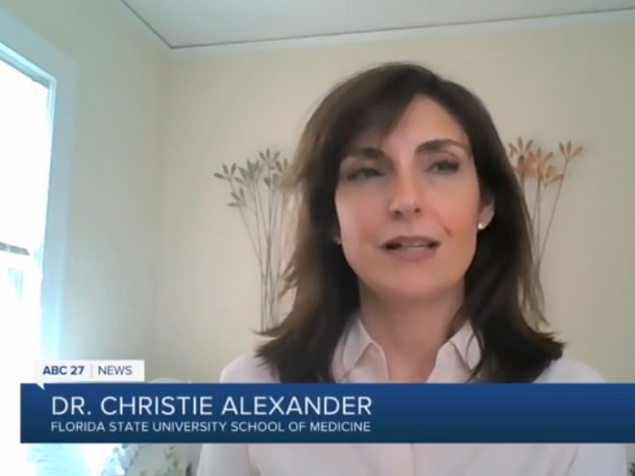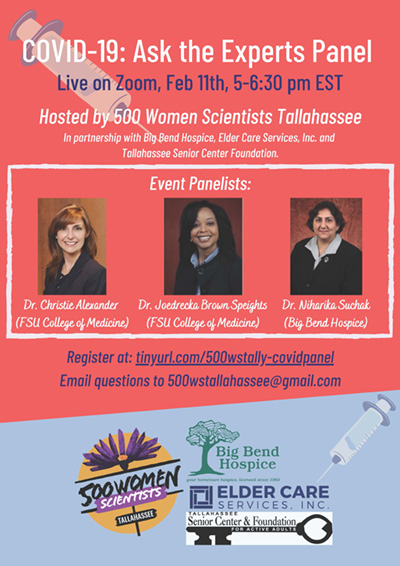FOR IMMEDIATE RELEASE
CONTACT: Kelsey Klopfenstein, University Communications
(850) 644-1066; kklopfenstein@fsu.edu
Feb. 3, 2021
TALLAHASSEE, Fla. — Heart disease is the leading cause of death in the United States. Someone has a heart attack every 39 seconds, and cardiovascular disease claims more lives each year than all forms of cancer combined, according to the American Heart Association’s 2021 Heart Disease and Stroke Statistics Update.
The American Heart Association sponsors “American Heart Month” every February as a strategy for increasing heart disease awareness and promoting prevention at home and in the community. In conjunction with Heart Month, National Heart Failure Awareness Week takes place Feb. 14 – 20.
Florida State University experts are available to comment on a variety of topics related to heart disease awareness and self-care after heart failure.
Laurie S. Abbott, Ph.D., RN, PHNA-BC, assistant professor, College of Nursing
(850) 644-6008; labbott@fsu.edu
Abbott’s research involves health promotion and prevention of chronic disease presentation, progression and exacerbation among rural populations. As a board-certified advanced public health nurse, Abbott has conducted two cluster randomized trials that tested culturally relevant, evidence-based health promotion and cardiovascular disease risk reduction interventions in rural community settings. She is currently involved in an intervention study with Lucinda Graven that tests the effectiveness of a curriculum intended to improve health outcomes, promote self-care and reduce disease exacerbation among people living with heart failure in rural areas.
“‘American Heart Month’ is a great reminder to take care of our hearts. The good news is that most of the risk factors of heart disease such as diet, physical activity, weight, smoking and diabetes are modifiable. A healthy diet and increased physical activity can assist us in attaining or maintaining our optimal weight target goals. Resources to assist in smoking cessation are available from the Tobacco Free Florida program and local county health departments. People living with diabetes and hypertension can decrease their cardiovascular disease risk by following the dietary recommendations and medication regimens prescribed by their health care providers. The current pandemic also brings important considerations for heart health. The COVID-19 virus has the potential to cause serious cardiovascular consequences including myocardial injury and inflammation, heart failure and stroke and can be a precursor of disease exacerbation among people currently managing heart disease. Prevention of cardiovascular disease and COVID-19 is key.”
Lucinda J. Graven, Ph.D., APRN, FAHA, associate professor, College of Nursing
(850) 644-5601; lgraven@fsu.edu
Graven’s research focuses on improving outcomes for heart failure patients and their family care partners through the development and testing of cognitive-behavioral interventions. Her intervention, The Coping in Heart Failure Partnership, was originally tested in heart failure patients and has been adapted for dyads (patient and family care partner). Graven and Abbott are currently recruiting for The Coping in Heart Failure Partnership – Dyads study with a special focus on rural populations due to the higher mortality and hospitalization rate in this group. Participants in this interventional program will partner with an Advanced Practice Nurse for 13 weeks to identify and develop strategies to manage problems related to heart failure. Graven was recognized as a Fellow of the American Heart Association in 2019.
“Currently, there are more than 6.5 million people living with heart failure in the United States, with many requiring assistance with activities from a family care partner. Care partners play an important role in assisting the patient with disease management while also providing emotional support. Caring for heart failure patients is stressful and caregivers commonly provide support at a cost to their own physical and emotional health. Interventions which support the dyad and provide emotional support are needed to improve outcomes for both the patient and care partner. Overall, mortality and hospitalization rates for heart failure patients are high, but rural residents are at greatest risk for poor outcomes. My current research focuses on improving family processes to facilitate coping and disease management in rural heart failure dyads.”
P. Bryant Chase, Ph.D., professor of Biological Science, College of Arts & Sciences
(850) 645-4775; chase@bio.fsu.edu
Chase’s research focuses on cellular and molecular biomechanics and the structure of striated cardiac and skeletal muscles. He’s currently studying genetic variants in cardiac troponin that cause hypertrophic or dilated cardiomyopathies. Troponin is the calcium ion sensor that regulates contraction of the heart and pumping of blood. It is central to the heart’s function, and small changes in the troponin gene’s DNA sequence may result in detrimental changes in the heart’s ability to pump blood. This research focus derives from concern that cardiovascular diseases remain the major reason for death and hospitalization in the developed world. Chase was recognized as a Fellow of the American Heart Association in 2002.
“The central theme of my research program is to understand the biophysical basis of biological motility, its regulation by calcium ions, and modulation by cellular metabolism. Much remains to be learned about actomyosin interactions and their regulation, especially in cardiovascular function and diseases, cancer (metastasis), human performance, and bionanotechnology (biological nanomotors and protein mechanics). My experimental work has most often been directed toward answering molecular and cellular questions related to these topics.”
Stephen Chelko, Ph.D., assistant professor, College of Medicine
stephen.chelko@med.fsu.edu
Chelko studies arrhythmogenic cardiomyopathy (ACM), one of the most arrhythmic forms of heart disease and a leading cause of sudden cardiac death in young people and athletes. Myocyte death is one of the most cited yet poorly understood pathological features of ACM, despite its pivotal role in contributing to fibrotic remodeling and re-entrant ventricular tachycardia. Myocyte cell death occurs in many forms of inherited or acquired cardiomyopathies, not just in ACM, but exercise fuels cardiomyocyte cell death, myocardial inflammation and fibrotic scarring in patients with ACM. Chelko investigates why exercise is so deleterious for subjects with ACM. His lab uses models of ACM and patient samples from those afflicted by ACM to uncover abnormal cell signaling mechanisms and test the efficacy of FDA-approved drugs on the prevention of disease outcomes.
“ACM primarily affects children and young adults in their second decade of life. These two vulnerable populations are plagued by harboring a rare, inherited heart disease, which means there is little room for returns on investments by pharmaceutical companies or by state and federal funding agencies. The Orphanet Journal of Rare Diseases stated in 2014, ‘While a rare disease is rare, the prevalence of a disease is of no consolation to those afflicted by it.’ I repeat this quote to myself often, and it’s what drives my research.”
Judy Delp, Ph.D., professor of Biomedical Sciences, College of Medicine
(850) 645-1868; judy.delp@med.fsu.edu
Delp’s research focuses on changes that occur in the cardiovascular system during aging and determining whether age-related impairment of cardiovascular function can be prevented or reversed by performance of regular physical activity.
“The central theme of my research is to understand how the heart and blood vessels adapt to regular physical activity. In addition, because advancing age is a significant risk factor for cardiovascular disease, we want to understand why physical activity keeps the heart and blood vessels so healthy as we age. We want to understand how much of the aging of the cardiovascular system can be prevented by a lifestyle that includes regular physical activity.”
###



